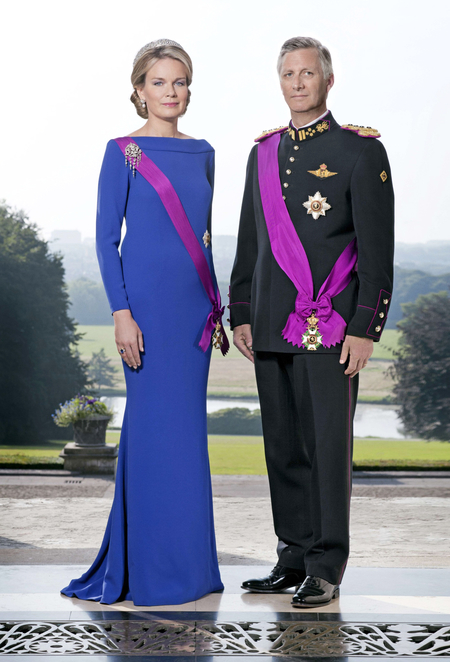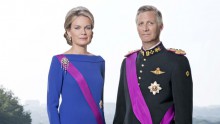THERE ARE SIX GOVERNMENTS AND SIX PARLIAMENTS IN BELGIUM
Belgium is a constitutional, popular monarchy and a federal parliamentary democracy. The bicameral federal parliament is composed of the Senate and the Chamber of Representatives. The former is composed of 50 senators appointed by the parliaments of the communities and regions and 10 co-opted senators. Prior to 2014, most of the Senate’s members were directly elected. The Chamber’s 150 representatives are elected under a proportional voting system from 11 electoral districts. Belgium has compulsory voting and thus maintains one of the highest rates of voter turnout in the world.
The King (Philippe since July 21, 2013) is the head of state, albeit with limited prerogatives. He appoints ministers, including the Prime Minister, who have the confidence of the Chamber of Representatives to form the federal government. The Council of Ministers includes no more than 15 members. With the possible exception of the Prime Minister, the Council of Ministers is composed of an equal number of Dutch-speaking and French-speaking members. The judicial system is based on civil law and originates from the Napoleonic Code. The Court of Cassation is the court of last resort, with the Court of Appeal one level below.
Belgium is sometimes called a double federation, as it is simultaneously divided into three regions and three language-based communities. The regions have jurisdiction over the local economy, public works (e.g., road construction), environmental protection, and other matters. The linguistic communities deal, above all, with culture-related issues, including education, research, and sport.
Each region and community has a parliament and a government of its own. Yet, by mutual consent, the parliament and the government of the Flemish region and the Dutch-speaking community were united. Therefore, there are six governments and six parliaments in Belgium. The federal government is responsible for coordination of the actions of the other five governments as well as for matters of national importance, such as defense, foreign affairs, national economic and monetary policy, pensions, and public health.
ON PARTICULARITIES OF THE BELGIAN MONARCHY
The king’s duties include close contacts with a wide circle of Belgian citizens, such as members of the federal, communal, and regional government, MPs, political leaders, representatives of the economic, social, and scientific sectors, academics, and the media.
The king and the royal family also promote the private and public initiatives that help improve social conditions. The monarch and his family represent Belgium on the highest level (state visits, trade missions, international forums).

THE ROYAL PALACE IN DOWNTOWN BRUSSELS IS THE BELGIAN MONARCH’S OFFICIAL RESIDENCY SITUATED IN FRONT OF BRUSSELS PARK. THE KING USUALLY USES THIS STRUCTURE AS A PLACE FOR OFFICIAL FUNCTIONS
The constitutional monarchy of Belgium, often referred to as people’s monarchy, defines the role of the head of state as one who serves the people. This role is based on what the constitution and the country’s “constitutional DNA” set forth.
The Belgian historian Jean Stengers wrote that “some foreigners believe the monarchy is indispensable to national unity. That is very naive. He is only a piece on the chessboard, but a piece that matters.” However, experts point out, citing the Constitution of Belgium, that the king is in fact not the head of the executive branch but a representative of the nation.
“WE CALL HIM THE KING OF THE BELGIANS”
“The king of Belgium plays a very important symbolic and, at the same time, political role. As for the political role, it consists not in showing personal power but, rather, in encouraging certain actions or expressing certain proposals in a dialog with the country’s political actors,” the Belgian Ambassador to Ukraine, Luc Jacobs, told The Day.
In his words, the king represents the country and does not personify the state. “Incidentally, we call him the king of the Belgians, not the king of Belgium. We do it deliberately, for he represents the nation, the people, rather than the state. This was laid down in 1831 when the Constitution of Belgium was adopted. This innovation in the Belgian constitution set out that the king’s role is to represent the nation, the people,” the ambassador emphasized.
In his opinion, the king has various instruments to strengthen democracy. Particularly, he plays the role of an intermediary in dialogs with politicians, representatives of the federal government, parliament, and objects of the federations.
“THE KING PERSONIFIES UNITY IN THE COUNTRY”
“The king plays an important role, personifying unity in the country, which is of paramount importance in a federal state,” the ambassador emphasizes. At the same time, he pointed out that the Belgian king has no crown. There is no coronation ceremony in Belgium at all – the king receives his powers and becomes the head of state, reading out the oath of allegiance to the people.
The text of the oath is short: “I swear to observe the Constitution and the laws of the Belgian people, to preserve the country’s national independence and territorial integrity.” In other words, Mr. Jacobs says, the successor to the throne becomes the king after taking the oath to abide by the Constitution of Belgium which guarantees democratic values, principles, and institutions.
The ambassador notes that there are some sentiments on the political landscape and in society in favor of a presidential form of government in Belgium, but they are rather rare and uninfluential. On the whole, the Belgians are satisfied and happy that the country remains a constitutional monarchy.
KINGS ALBERT I AND BAUDOUIN I ARE THE MOST POPULAR MONARCHS
“It is difficult to measure the popularity of a king,” Mr. Jacobs continues. “I can cite the example of King Albert I who was called knight-king for his role during World War One, when Belgium was fully occupied by German troops except for a small area in the east.
“King Albert I earned profound respect, prestige, charisma, and popularity for supporting and personifying the Belgian army’s resistance to the occupational forces. This has remained in the collective memory of the Belgian population.

QUEEN MATHILDE AND KING PHILIPPE
“King Baudouin I was also very popular for being the longest-reigning monarch in the Belgian dynasty.
“If you could only see how many people came to pay him their last respects, when he died on July 31, 1993! This shows the measure of respect for him and his popularity in the aggrieved nation – a moment that left its imprint on history.”
THE WHOLE ROYAL FAMILY IS OPEN AND ACCESSIBLE
The whole royal family is open and accessible. They mix with people and do not hide in palaces. They are among the people no matter what event – joyful or sorrowful – may have occurred. “I can remind you that when an act of terror was committed in March past year, the king immediately went to the airport and the metro station to thank the rescuers and to the hospital, where he inquired about the health of the wounded,” Mr. Jacobs said.
They also appear before the people, including on television, during important national events.
“The royal family – both the king and the queen – is really interested in being accessible and open, whenever possible, to people. They impart a modern content to monarchy, which makes them popular. They have a website. Particularly, the king has a personal page in Facebook and Twitter. The royal family uses all the instruments of modern communications to be closer to the people. King Philippe knows three languages which he uses in his speeches. This shows his respect for our country’s multilingual setup and the importance that he attaches to this,” the ambassador pointed out.
ON THE “ROYAL ROAD”
Asked about the likely historical ties between the ancient Ukrainian and Belgian dynasties, particularly, in the Kyivan Rus’ era, Mr. Jacobs said: “I was told that Anna of Kyiv went through the Belgian town of Arlon on her way to Paris. But this question needs further research. Do you know about the King’s Route (Via Regia) from Kyiv to Calais and down to Santiago de Compostela? It was called so because it was the main road that connected various kingdoms, principalities, and duchies in the 9th-10th centuries AD – from the Kyivan Rus’ period until the 14th-15th centuries. The King’s Route passes now from Calais to Kyiv along the E40 highway. My house in Belgium is a few kilometers away from the E40 highway, and here in Kyiv the residence is near the Pushkin Park on Peremohy Avenue. In other words, I can walk from my house to the E40 highway – the former King’s Route – and reach Kyiv straight away. Incidentally, the Council of Europe is advancing the concept of the King’s Route, through which this highway passes, to promote cooperation between various countries.”
The king never gives interviews
 By Mykola TOCHYTSKYI
By Mykola TOCHYTSKYI
By contrast with other monarchies in the world, the monarch in Belgium is called the king of the Belgians, not the king of Belgium. This particularity emphasizes that, from the very outset, the royal dynasty of Belgium, as well as other political institutions, has been obeying the laws of a democratic state and its powers are regulated by the constitution.
Belgium is a federal state composed of three regions – Dutch-speaking Flanders, French-speaking Wallonia, and the bilingual Brussels-Capital Region. There is also a small German-speaking community.
The Constitution of Belgium sets a clear guideline for democratic governance: “All powers emanate from the Nation. These powers are exercised in the manner laid down by the Constitution.”
Ascending the throne, Belgian kings give an oath strictly in accordance with Article 91 of the Constitution: “I swear to observe the Constitution and the laws of the Belgian people, to preserve the country’s national independence and its territorial integrity.” No successor can mount the throne without swearing this oath.
Under the constitution, the king of the Belgians is above ideological, religious, and political debates or economic interests. Supporting no political, civic or other groups in society, the king performs the mission of guardian of the state. He is a symbol of the nation’s unity and invariability and a moderator of political life.
The king signs the laws passed by parliament, but he has no right of veto and thus cannot overrule the law he objects to.
The participation of the king in any events held in Belgium, such as ceremonies, conferences, and visits, increases their level as much as possible.
The king periodically delivers speeches. The Belgian media regularly spotlight the events in which the king participates and broadcast his speeches. However, owing to his unique status, the king does not join public debates on specific issues and remains out of the focus of political, public, and other discussions that naturally occur in the media, as is the case in any democratic state. For this reason, oddly enough, even in the current era of instant and comprehensive coverage by the electronic media, the king’s “moves” on Belgium’s political chessboard remain almost unnoticeable for the public at large. It is also interesting that the king never gives interviews.
Mykola Tochytskyi is Ukraine’s Ambassador to Belgium








